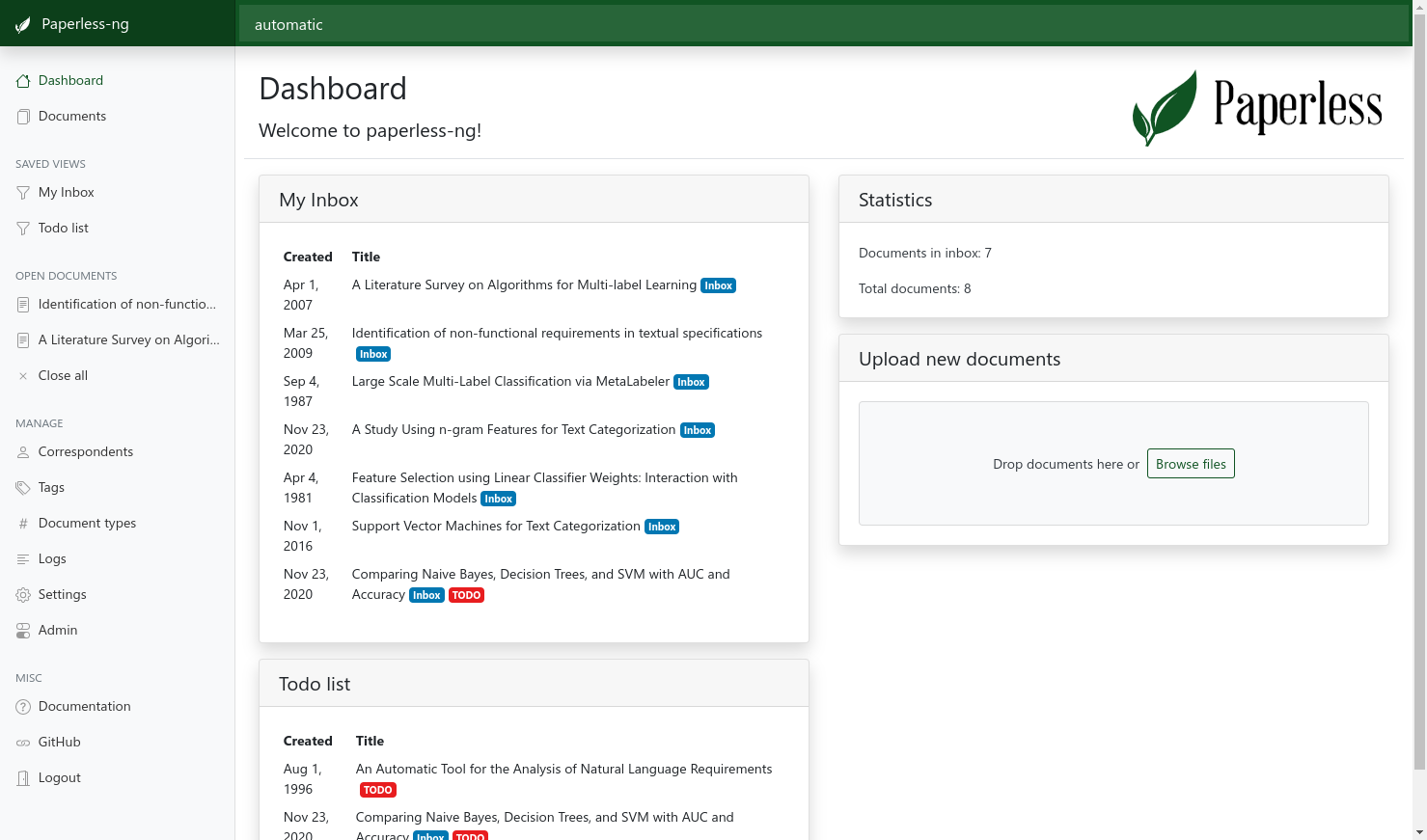This project is not dead! Rather, this project is now maintained as a community effort at https://github.com/paperless-ngx/paperless-ngx, a direct continuation of this project and drop-in replacement. Please see their project page and the documentation at https://docs.paperless-ngx.com/ for details.
Paperless (click me) is an application by Daniel Quinn and contributors that indexes your scanned documents and allows you to easily search for documents and store metadata alongside your documents.
Paperless-ng is a fork of the original project, adding a new interface and many other changes under the hood. These key points should help you decide whether Paperless-ng is something you would prefer over Paperless:
For a detailed list of changes, have a look at the change log in the documentation, especially the section about the 0.9.0 release.
Paperless does not control your scanner, it only helps you deal with what your scanner produces.
Buy a document scanner that can write to a place on your network. If you need some inspiration, have a look at the scanner recommendations page. Set it up to "scan to FTP" or something similar. It should be able to push scanned images to a server without you having to do anything. Of course if your scanner doesn't know how to automatically upload the file somewhere, you can always do that manually. Paperless doesn't care how the documents get into its local consumption directory.
Wait for paperless to process your files. OCR is expensive, and depending on the power of your machine, this might take a bit of time.
Use the web frontend to sift through the database and find what you want.
Download the PDF you need/want via the web interface and do whatever you like with it. You can even print it and send it as if it's the original. In most cases, no one will care or notice.
Here's what you get:

If you want to see paperless-ng in action, more screenshots are available in the documentation.
The recommended way to deploy paperless is docker-compose. The files in the /docker/compose directory are configured to pull the image from Docker Hub.
Read the documentation on how to get started.
Alternatively, you can install the dependencies and setup apache and a database server yourself. The documenation has a step by step guide on how to do it. Consider giving the Ansible role a shot, this essentially automates the entire bare metal installation process.
Read the section about migration in the documentation. Its also entirely possible to go back to Paperless by reverting the database migrations.
The documentation for Paperless-ng is available on ReadTheDocs.
Paperless is available in many different languages. Translation is coordinated at crowdin. If you want to help out by translating paperless into your language, please head over to #212 for details!
Feature requests can be submitted via GitHub Discussions, you can search for existing ideas, add your own and vote for the ones you care about! Note that some older feature requests can also be found under issues.
For bugs please open an issue or start a discussion if you have questions.
There's still lots of things to be done, just have a look at open issues & discussions. If you feel like contributing to the project, please do! Bug fixes and improvements to the front end (I just can't seem to get some of these CSS things right) are always welcome. The documentation has some basic information on how to get started.
If you want to implement something big: Please start a discussion about that! Maybe I've already had something similar in mind and we can make it happen together. However, keep in mind that the general roadmap is to make the existing features stable and get them tested.
Paperless has been around a while now, and people are starting to build stuff on top of it. If you're one of those people, we can add your project to this list:
These projects also exist, but their status and compatibility with paperless-ng is unknown.
This project also exists, but needs updates to be compatile with paperless-ng.
Document scanners are typically used to scan sensitive documents. Things like your social insurance number, tax records, invoices, etc. Everything is stored in the clear without encryption. This means that Paperless should never be run on an untrusted host. Instead, I recommend that if you do want to use it, run it locally on a server in your own home.